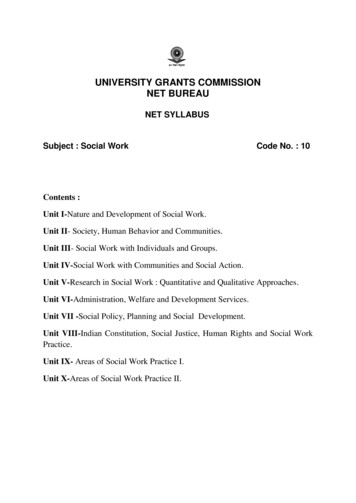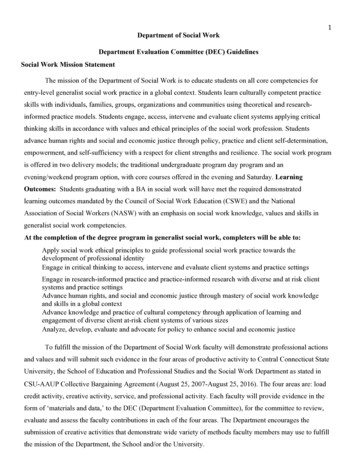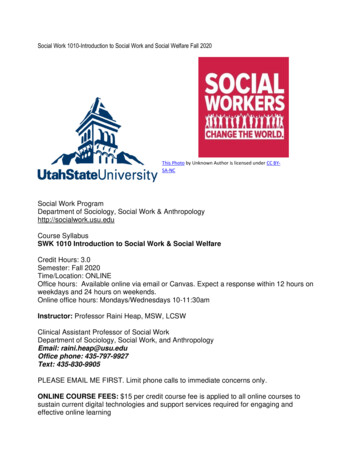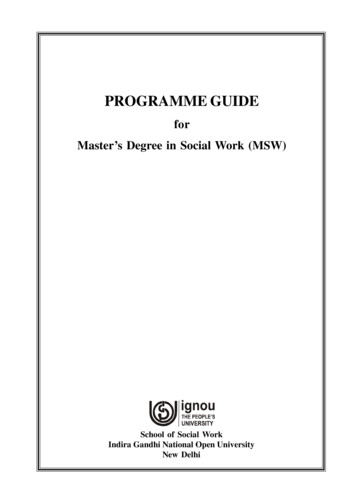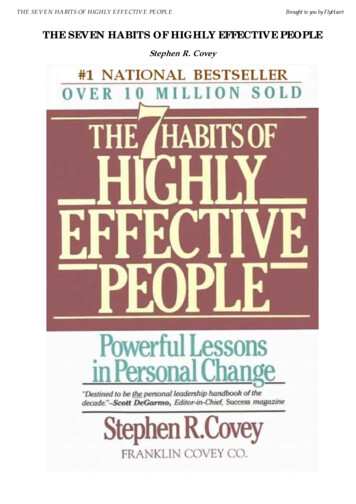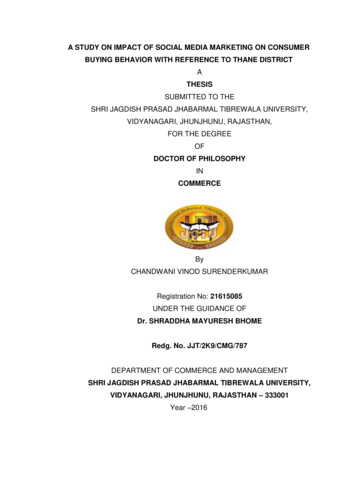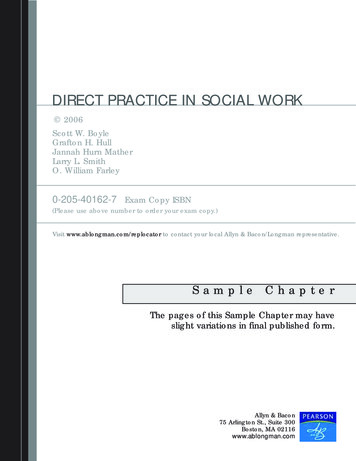
Transcription
ISSN 0950 2254ISBN 0 7559 2859 8(web only publication)ISBN 0-7559-2859-8www.scotland.gov.uk/socialresearchThe text pages of this document are produced from 100% ElementalChlorine-Free material.The paper carries the Nordic Ecolabel for low emissions duringproduction, and is 100% recyclable.Astron B44481 12/059 780755 928590EducationEffective Social Workwith Older People
EFFECTIVE SOCIAL WORK WITH OLDER PEOPLEBrian Kerr, Jean Gordon, Charlotte MacDonald and Kirsten StalkerA PAPER PREPARED FOR THE SCOTTISH EXECUTIVE BY THESOCIAL WORK RESEARCH CENTRE, UNIVERSITY OF STIRLINGAS PART OF THE 21ST CENTURY SOCIAL WORK REVIEWScottish Executive Social Research(2005)The views expressed in the report are those of the author(s) and do not necessarilyreflect those of the Scottish Executive or any other organisation(s) by which theauthor(s) is/are employed.The Scottish Executive is making this research report available on-line in order toprovide access to its contents for those interested in the subject. The Executivecommissioned the research but has not exercised editorial control over the report.This web only report is accompanied by "Research Findings No 11 Effective SocialWork With Older People " also in web only format. Both reports are published byInformation and Analytical Services Division, Scottish Executive EducationDepartment, Victoria Quay, Edinburgh, EH6 6QQ. If you have any enquiries aboutthese reports please contact the Dissemination Officer on 0131-244-0316.These reports were commissioned by the 21st Century Social Work Review Group toinform their work. Copies of this document had already been released on the 21stCentury Social Work Review website (http://www.21csocialwork.org.uk/).Both reports were published on The Scottish Executive website in December 2005.
CONTENTSEXECUTIVE SUMMARY1CHAPTER ONE: INTRODUCTIONAims and objectives of this reviewScopeStructure of this paperMethodsLimitations66677CHAPTER TWO: EFFECTIVENESS - DEFINING QUALITY OUTCOMES FOR OLDER PEOPLEOlder people’s views about effective social work8Another approach to effectiveness - what works?11Performance information13Conclusions13CHAPTER THREE: THE SOCIAL AND POLICY CONTEXT FOR EFFECTIVESOCIAL WORK WITH OLDER PEOPLEIntroductionPoverty in old ageAgeismIntegrated Services – A Joint FutureConclusions1515171921CHAPTER FOUR: OLDER PEOPLE: THEIR NEEDS FOR SOCIAL WORKIntroductionDemographyPeople with learning disabilitiesPeople with dementiaPeople with other mental health needsAddictions and substance misusePeople with physical illness, impairment or frailtyOlder carersPalliative care – the need for a holistic approachConclusions22222324252626272829CHAPTER FIVE: ROLES, TASKS AND SKILLS FOR EFFECTIVE SOCIALWORK WITH OLDER PEOPLEIntroductionWhat is the social work role?Assessing the needs of older peopleAssessment and integrated workingMonitoring and reviewing careCare management for people with complex needsBalancing rights, risks and needsThe duty to protectLoss change and transitionThe social work role in health care settingsGroup care settingsWorking with family and carersConclusions31313233343435373941424343CHAPTER SIX: CONCLUSIONS AND IMPLICATIONS FOR EFFECTIVESOCIAL WORK WITH OLDER PEOPLE45REFERENCES50
EXECUTIVE SUMMARYINTRODUCTION1As part of the 21st Century Review of Social Work, the Scottish Executive asked theSocial Work Research Centre at the University of Stirling to review the evidence base foreffective social work with older people. The objectives were to identify effective and desirable outcomes for older people, including outcomesdesired and defined by older people themselvesto identify the distinctive skills required by social workers in order to achievedesirable and effective outcomesto draw out and discuss the implications for future policy and practice in this field.2This paper looks at effective social work with older people with a range of needs andconditions and considers desirable outcomes in a variety of domains and settings.3The work involved a review of various key texts and recent research. In the short timeavailable, it was not possible to conduct a systematic study nor a comprehensive literaturereview.EFFECTIVENESS – DEFINING QUALITY OUTCOMES FOR OLDER PEOPLE4There are various drawbacks to standard satisfaction surveys, including limitedvalidity. They may be particularly unreliable in eliciting older people’s views.5Many older people attach great importance to their relationships with social workersand care staff. However, older people may not always identify or distinguish the contributionof particular professionals; rather, they may form a view about the overall quality of servicesreceived.6Recent consultation exercises with service users and carers in Scotland have identifiedthe importance to them of being treated as individuals, of exercising choice and control andof a ‘capacity’ model of assessment. A holistic approach to assessment and service deliveryis appreciated, along with sensitivity, flexibility and respect for personal dignity.7Older people value services which can support them in all aspects of their lives, asrequired, not just with personal care and relationships. Low level preventative help, likehousework and gardening, enhances quality of life and helps maintain independence.However, these tasks do not require qualified social workers.8Effective social work with older people should focus on the key social work tasks ofassessment, care management and review for people with complex needs, as distinct from theprovision of social services to the majority of older people who have relativelystraightforward needs.1
9A five year research and development programme conducted at York Universityexamined outcomes of social care for older people, disabled people and carers. It identifiedthree types of desirable outcome – maintaining current quality of life, facilitating positivechange and impacts of the service process. The second of these may be most pertinent toeffective social work with older people. ‘Change’ outcomes to aim for include improvementsto physical functioning, confidence, skills and morale.10An alternative approach to examining effectiveness lies in performance information,although this remains a contested area. The 21st Century Review Group has set up aPerformance Information Subgroup to address some of the difficulties involved.THE SOCIAL AND POLICY CONTEXT FOR SOCIAL WORK WITH OLDERPEOPLE11A substantial number of older people in Scotland live in poverty or face financialhardship. Where possible, effective social work with older people will involve incomemaximisation, combined with a sensitive approach to discussing financial matters.12The evidence shows that older people routinely face discrimination, for example,through stereotyping and denial of opportunities available to other adults. Anti-ageism is anessential part of effective social work, along with consideration of issues of gender, race,disability and sexual orientation.13Recent policy initiatives in Scotland emphasise the importance of joint working and a‘Joint Future’, notably through the single shared assessment first developed for older people.The Scottish Executive has not issued a framework specific to working with older people, asit has for other service user groups, but integrated services and teams have developednationally. Critics have warned that there is little theoretical basis for this approach andresearch had identified a number of underlying difficulties. The Interim Report of the 21stCentury Social Work Review notes that social workers in integrated teams have variedexperiences of their effectiveness and that clarity of roles and responsibilities, coupled withgood support, are essential.OLDER PEOPLE: THEIR NEEDS FOR SOCIAL WORK14Old age is not in itself a problem, pathology or indication of need. Older peopleshould not be seen as an homogeneous group with a single set of needs.15Significant demographic changes affecting projected numbers of older people must betaken into account when planning effective future deployment of social workers. The numberof people of pensionable age in Scotland is set to rise significantly while the number ofpeople in the age groups most likely to care for older people is decreasing.16People with learning disabilities are living considerably longer than before. Thosewith Downs Syndrome have an increased risk of developing dementia. Older people withlearning disabilities should have access to the same health and social care facilities as anyoneelse. Former residents of long stay institutions may need particular support in old age,especially if a move to a care home becomes likely.2
17The incidence and impact of dementia, and the implications for effective social workpractice, are much better understood today than they were just 10 years ago. People fromBlack and minority ethnic communities form a growing proportion of those affected. Socialworkers must be aware of cultural variation in perceptions of dementia. Mainstream, personcentred services should be available to all.18There is little research evidence about the impact of mental health problems, otherthan dementia, on older people. Depression is the most prevalent condition, often linked toloss or poor physical health. However, depression often goes undiagnosed and untreated.19While alcohol consumption generally decreases with age, alcohol and substancemisuse pose significant problems for some older people. Although often overlooked,substance misuse in older people responds to treatment at least as well as for younger agegroups. Older people who develop alcohol related conditions such as Korsakoff’s syndromemay require specialist facilities.20The majority of older people aged up to 85 do not report long term illness orimpairment. However, certain conditions are associated with old age and can seriously affectpeople’s ability to carry out daily living activities. Social workers may not be best placed toprovide assessment and care management in every case but where major loss and change areinvolved, their particular skill mix will be most appropriate.21One in six carers is an older person, many of whom provide a very high level ofweekly care. They may have to deal with disabling conditions of their own as well as thedemands of supporting another person. Where breakdown or deterioration occurs, perhapsbringing relationship stress, grief and loss, social workers have much to offer in terms ofassessment, care planning and counselling.ROLES, TASKS AND SKILLS FOR EFFECTIVE SOCIAL WORK WITH OLDERPEOPLE22Standard social work texts contain less information about working with older peoplethan about some other service user groups. At the same time, there are arguments againstcategorising older people as a separate group, as if different from other adults.23Effective social work with older people draws on distinctive aspects of the socialwork role – sensitive communication, moving at the individual’s pace, starting where theclient is, supporting the person through crisis, challenging poor practice, engaging with theindividual’s biography and promoting strengths and resilience.24Few studies have evaluated the effectiveness of monitoring and review or the relativeoutcomes of different approaches to these tasks. There are indications that insufficientattention is sometimes paid to monitoring and review.25In 2002, nearly 35,000 older people were resident in Scottish care homes. Standardsof care are variable: social workers have a vital role in ensuring that individuals’ assessedneeds are met when they move into a care home and, where appropriate, in advocating forbetter quality of care.3
26A review of care management in Scotland reinforced an important early premise ofcare management - that it be directed at people with complex, fluctuating or rapidly changingneeds. This requires a range of skills, including those ‘traditionally’ associated with socialwork, particularly the ability to work with complexity and uncertainty.27Social workers engage with older people facing various types of risk, including thosewho are being abused and those who, because of dementia, are no longer aware of everydaydangers. Effective social work in these situations demands a finely tuned balance betweenpromoting independence and self determination – core social work values – whilesimultaneously providing adequate and sensitive protection. Here, social work tasks includebuilding trust and support, assessing risk and vulnerability, and providing information aboutand opportunities to discuss different options.28Social workers have a number of specific legislative duties relevant to working witholder people. In fulfilling these duties, for example in the role of mental health officer orwhen conducting assessments prior to ‘significant intervention’ in relation to ‘incapable’adults, social workers must, again, balance individual rights with the need to protect andpromote the welfare of people in need. In addition, careful mediation between the competingwishes of the older person and family relatives, or between family relatives themselves, maybe required.29Old age may be marked by experiences of loss, change and transition. Social workersneed a good understanding of the significance and impact of life course transitions and theability to see the older person in the context of his or her life history.30The social work contribution to palliative care includes supporting the older personand the family through loss and bereavement, taking a ‘whole system’ perspective,ameliorating the practical impact of change and attending to emotional and spiritualstruggles. In some cases, educating and supporting the multi-disciplinary team will be anadded dimension.31Social workers in hospitals and other health care settings are well placed to identifyand respond to the needs of older people. Research has shown that deploying social workersin Accident and Emergency wards has benefited older patients. In healthcare settings, it hasbeen found that multi disciplinary teams led by social workers are particularly effective inmatching individual needs to services.32Few studies of group care have looked specifically at the social work contribution.However research about care homes has identified the importance to good quality care ofvarious tasks in which social workers can be key players – good information provision, fairand clear contract terms and, where appropriate, supporting older people to use complaintsprocedures.CONCLUSIONS AND IMPLICATIONS33Older people do not require social work support simply because of their age. Theywill have largely the same range of needs for social work as any other adults. They are most4
likely to seek social work help or develop needs arising from a combination of conditions andcircumstances, often involving loss and change.34Social work with older people cannot be considered effective unless older peoplethemselves are satisfied with it. Service users want to be listened to and respected asindividuals. Many older people share traditional social work values, such as a concern forrelationships, and appreciate social work skills. The social work process is important, as wellas the outcome.35Social care with older people is more effective when its intended outcomes areidentified at an early stage – during assessment – and built into care planning. Older peoplemust be closely involved in the process, with outcomes based on their wishes and priorities asfar as possible.36Older people like services which support them in various aspects of their lives, notjust personal care and relationship needs. Low level preventive services are valued.37Effective social work with older people should focus on intensive care managementwith those who have complex, fluctuating and/or rapidly changing needs. Pressure to managebudgets and establish eligibility must not reduce social workers’ capacity to engage with theolder person and use the full repertoire of their skills in a holistic way.38Social workers bring a unique mix of skills and expertise to situations of complexity,uncertainty and conflict. These include a ‘whole system’ view, engaging with the olderperson’s biography, supporting individuals and families through crises associated with loss ortransition, helping to ameliorate the practical impact of change and challenging poor practice.39Social workers must work creatively with risk. They need finely tuned skills toachieve the ‘right’ balance between promoting self determination and independence for theolder person while, at the same time, ensuring that vulnerable individuals have adequateprotection.40There is much scope for a positive, proactive approach to social work with olderpeople, for example through income maximisation, promoting individual strengths andcapacity, and helping people rebuild confidence and networks following loss or change. Antiageism is an essential element, while issues of gender, race, class and ethnicity must be takeninto account.41Recent moves towards joint working within a multi-disciplinary setting, and theintroduction of single shared assessment, make it imperative for social workers to be clearand confident about their distinctive role.42The ongoing debate among service planners regarding the appropriate degree andnature of specialism for social workers with older people is little reflected in the literature.However research and practice experience leads us to conclude that social workers with olderpeople require a strong foundation of core, generic social work skills and values, on whichspecialist knowledge and skills can build.5
CHAPTER ONE INTRODUCTIONAIMS AND OBJECTIVES OF THIS REVIEW1.1As part of the 21st Century Review of Social Work, The Scottish Executive asked theSocial Work Research Centre at the University of Stirling to review the evidence base foreffective social work with older people. The aim was to explore ‘what works’ in terms ofeffective practice by qualified social workers and what leads to quality outcomes for olderpeople and their carers. This review will sit alongside similar papers commissioned by theScottish Executive on work with offenders (McNeil et al 2005) and work with children andfamilies (Walker 2005).1.2The specific objectives agreed for this piece of work are as follows: to identify effective and desirable outcomes for older people, including outcomesdesired and defined by older people themselves to identify the distinctive skills required by social workers in order to achievedesirable and effective outcomes to draw out and discuss the implications for future policy and practice in this fieldSCOPE1.3This review will cover: older people who have dementia, physical/sensory impairment, mental illness and/or complex health needsoutcomes in a variety of domains, including promotion and maintenance ofindependence, assessing and managing risk, assessing and managing vulnerability,personal care and work with familiesoutcomes in the range of settings in which older people live, for example, carehomes, with family, and at home aloneSTRUCTURE OF THIS PAPER1.4Chapter 2 considers different understandings of effectiveness, including the views ofolder people themselves. It examines evidence about aspects of effectiveness in social workwith this service user group. Chapter 3 looks at aspects of the wider context in which socialwork with older people takes place, while the following chapter discusses demographictrends and older people’s needs for social work support. Chapter 5 contains a detaileddiscussion of effective social work with older people, including practitioners’ statutoryduties, their role in protection and risk management, and the ways in which different settingscan impact on work with older people in key areas such as loss, change and grief.6
1.5The final chapter draws out the implications for the 21st Century Social Work Review,making reference to its interim report, for example, considering how the various social workroles identified in that report - such as counsellor, advocate and assessor - might apply tosocial work with older people.METHODS1.6The main task carried out by the project team was a review of various key texts andrecent research reports primarily from the UK. The team combines extensive experience inresearch in community care for older people with significant practice and managementexperience of services for older people: it is hoped that this balance is reflected in the paper.1.7The review draws on the recently published Older People and Community Care – areview of recent research (MacDonald 2004), also commissioned by the Scottish Executive.While there is a considerable amount of research and publications about the needs of olderpeople, the impact of demographic change and social policy developments, rather less workhas been conducted on evaluation of ‘what works’ and what is valued by older peoplethemselves, still less on the effectiveness of what social workers do. Consequently, thefindings and conclusions of the work presented here were discussed in a small, informalconsultation exercise with a number of very experienced and skilled social workers and socialwork managers, to facilitate as comprehensive a review as possible.LIMITATIONS1.8We were asked to present our review as a formal research report (using the standardScottish Executive research report template). This paper is not, however, the result ofsystematic research nor is it a comprehensive literature review, neither of which werepossible within the short timescale available of about six weeks. However, the findings arepresented in a style which we hope will be helpful and accessible to the 21st Century Reviewgroup.7
CHAPTER TWO EFFECTIVENESS - DEFINING QUALITYOUTCOMES FOR OLDER PEOPLE2.1 This chapter reviews several ways in which effective social work with older people maybe defined. Our starting point emphasises the importance of older people’s views about whathelps them to live well in later life.OLDER PEOPLE’S VIEWS ABOUT EFFECTIVE SOCIAL WORK2.2 A key factor in determining quality is the extent to which older people themselves aresatisfied with both the assessment of their needs and the services provided. Services whichprovide high quality care according to economic or clinical criteria are far from ideal if, as aresult of that care, the user is unhappy or dissatisfied.2.3A review of the literature on older people’s satisfaction with services in Britain andNorth America (Bauld at al 2000) concluded that“older people’s responses to satisfaction questions are affected by a range ofcomplex and interrelated factors. Disentangling the effects of user and carercharacteristics from expressed opinions poses considerable challenges forthose hoping to use satisfaction surveys to gauge service quality.”2.4The authors list nine factors or characteristics which they anticipate will influenceresponses or make interpretation difficult. These include: fear of dependency or reprisalreluctance to criticise individual workersentitlement (Users with limited resources receive services as an entitlement; thisnaturally may reduce their willingness to criticise or comment on quality, as theyare not ‘consumers’ in the usual sense of the word)expectations (Older service users are often characterised as having lowexpectations of services, which may affect satisfaction ratings. Expectations oftencentre around interaction issues - the manner in which services are provided rather than the nature of the services or quality of care)lack of knowledgephysical and mental health (including cognitive impairment)life satisfaction.Bauld et al (2000) comment:“There is clear evidence that people who use social services attachconsiderable importance to the relationships they have with staff (Barnes1992, Qureshi 1999), and that these relationships have a direct impact ontheir overall sense of well being. Secondly, life satisfaction or perceived wellbeing also has a direct impact on how users judge any services they receive.”8
2.5Older people may be unlikely to identify the contribution of a particular professional,such as a social worker, preferring to focus on the quality of the overall service.Evidence from the users and carers’ panel2.6As part of the wide consultation process for the 21st Century Review of Social Work,a panel of users and carers was invited to describe its dreams and aspirations for how servicesshould be provided in the future. They offered the following ideas: people should be valued as individuals: it is important to be an integrated part ofsociety need to understand where social workers are coming from, and vice versa need to be aware that carers need someone to talk to too freedom from fear and being able to share and contribute in a valued way choice and control through direct payments services should be about choice and control as consumers engaged listening - social worker’s skill of listening important - when practiced,much more effective-life changing development of a skill set, centred round issues (the manner in which services areprovided) rather than the nature of the services or quality of care.(Extract from a Minute of a users and carers’ panel meeting, part of the 21st Century Reviewof Social Work, provided by Review staff)2.7This panel also made several references to the importance of assessment and review: often services delivered by the social work department are not what the user wantsneed for whole person assessments - not simply about ticking boxesmore of a capacity model of assessmentthe need for regular reviews of support to determine whether the service offered isstill working or if it needs to change.(Further extract as above)Further evidence - the care development group2.8Jones et al (2001), in research undertaken to inform the work of the CareDevelopment Group about the implementation of free personal care, asked serviceusers and carers what kinds of support they valued. A strongly expressed viewemerged in focus groups that there should be“free entitlement to packages of personal care tailored to individual need,properly assessed, and extending to whatever kinds of support werenecessary to keep the individual living as independently as possible, withdignity and a good quality of life’ (p 48)”.There was a clear consensus amongst groups of both older and younger people that they –and, they thought, older people in general – would wish to stay in their own homes as long asthey could.9
2.9 Of particular relevance to our review, group members emphasised that caring for anolder person: must be individual, recognising both service users’ unique needs, and the othersupport available to themchanges over time, with needs often increasingmust deal with the whole person – not separate ‘nursing’, ‘social’ and ‘domestic’tasksrequires sensitivity and flexibility – and involves a relationshipshould attend to dignity, pride and quality of life, not just maintaining life and hygiene(Jones et al., 2001:61).2.10 Group participants in this work for the Care Development Group thought thatassessment should: be prompt when help was neededtake account of individual needs, circumstances, and preferencesuse information from a range of sources e.g. GP, District Nursebe multidisciplinary and undertaken only once, not lots of times by differentpeoplebe reviewed regularlylisten to the service user’s view – but also not always be totally determined by thisbecause the service user’s perceptions can be at odds with what is happeningtake account of and value the family carer’s contribution, recognising that carersupport can prevent greater needs arising (Jones et al, 2001: 66).2.11 There has been considerable debate about the value of user satisfaction studies,particularly in England and Wales. The Scottish Executive has commissioned research whichaims to develop reliable methods of assessing user and carer satisfaction with single sharedassessment (MacDonald 2004). One particular study produced results of relevance to thisreview, particularly in relation to the social work tasks of assessment and care managementwith older people (Chesterman et al 2001). This suggested that service users whose caremanager was a qualified social worker were more satisfied than those whose care managerhad been trained as a home help organiser. Furthermore, the greater number of social workerhours invested in setting up services, the greater the reported satisfaction with the experienceof social services.2.12 Research on satisfaction or effectiveness more often focuses on older people’sperception and experience of social services. It is hard to find studies which focusspecifically on social work. This may reflect the relative indifference of this client group tothe qualification of the person who is offering them help, compared with their interest instaff’s personal qualities, their approach and values. Studies also show that older people givegreat importance to services which assist them in every aspect of their lives, not just personalcare or relationship needs (MacDonald 1999). Another study has suggested that ‘low level’services, like help with housework, gardening, laundry and home maintenance, bothenhanced quality of life for older people and helped maintain their independence (Clark et al1998). Clearly, these are not the kind of services which social workers are, or need to be,centrally involved in arranging.10
2.13 Thus our review of effective social work with older people needs to concentrate onthe key social work tasks of assessment, review and care management for people with morecomplex needs, and it needs to maintain the distinction between this process and theprovision of social services which assist the majority of older people in need, who do notrequire the intervention of qualified social workers.ANOTHER APPROACH TO EFFECTIVENESS -WHAT WORKS?2.14 Outcomes, and particularly ‘what works’, have b
bringing relationship stress, grief and loss, social workers have much to offer in terms of assessment, care planning and counselling. ROLES, TASKS AND SKILLS FOR EFFECTIVE SOCIAL WORK WITH OLDER PEOPLE 22 Standard social work texts contain less information about working with older people than about some other service user groups.

